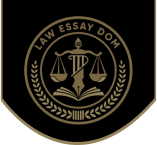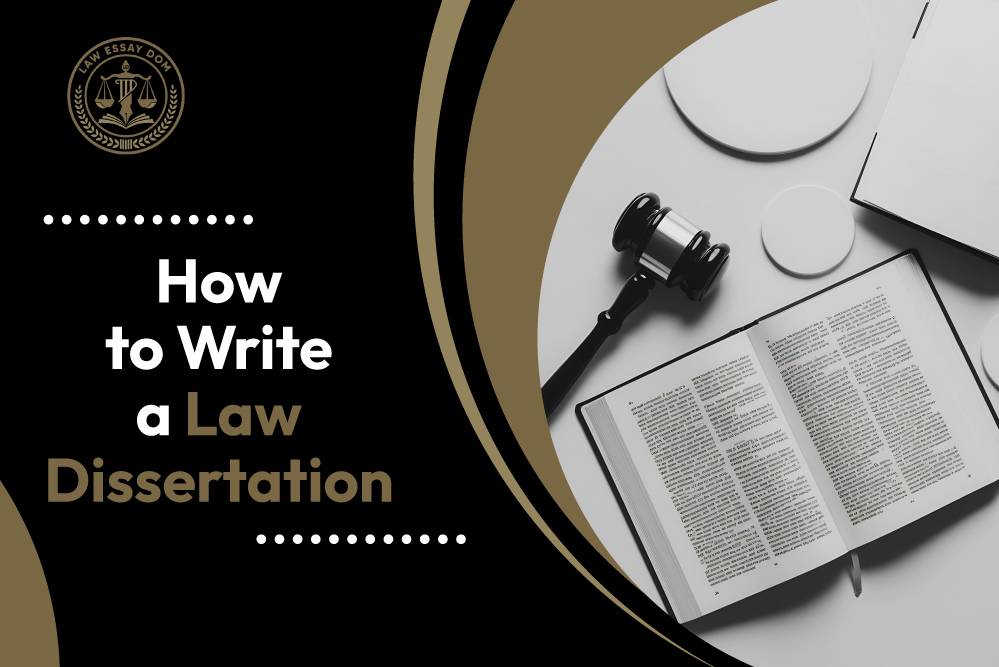Law dissertation writing is a complex process for any law student. However, you can get law dissertation writing help to make your writing process easier because a law dissertation requires thorough analysis, Knowledge processes, & critical research.
To start with this blog, first, let’s see what a law Dissertation is,
What is a Law Dissertation?
Writing a law dissertation is an important part of law postgraduate study.
Basically, a law dissertation is an academic paper that is well-researched and written properly by law students at the end of their study period.
Besides, the law dissertation is predominantly a long book, so to say, where a lawyer argues and defends a viewpoint due to the research undertaken as an academic requirement for a higher learning institution.
How to Write a Law Dissertation Introduction?
This process assumes that the first stage is writing a masterpiece organization of the dissertation’s introduction. This introduction must include the following essential aspects:
Present Timeliness:
Discussing and including any hot or fresh developments within the law is advisable, as this shows relevance when conversing about contemporary issues within the law.
Manageable Knowledge:
Do not overgeneralize, miss or go beyond the subject matter. Always remember that every dissertation topic should take a certain amount of space.
Original and Interesting:
One should always seek to add this knowledge in a different way. This will give your introduction an authentic turn and help you to prove your ability & thinking.
Relevant information:
Double-check that the information you have chosen is relevant to the main aspect and, most importantly, suits your career purposes. It may help you align with the best steps for your chosen subject.
How to Conduct Law Dissertation Literature Review?
Lastly, coming back to the subject of research, this paper seeks to provide some research sources which are easy to access:
Academic Journals:
Read through the updated findings and survey papers associated with your study area. Look for other publications such as the Oxford Journal of Legal Studies, Stanford Law Review, Harvard Law Review, etc.
Law–Related Databases:
You can also find the relevant information on the web sources, provided you can access databases, these databases give you complete analysis & case histories on the law’s current status, with regular amendments, on recent developments & revisions.
Government Publications:
Reading primary sources such as government reports, policy files, & legislative texts can help you better write and research the topic & its policy context.
Textbooks and Treatises:
Read authoritative legal books to understand the existing legal concepts and rules.
Interviews and Consultations:
Additionally, one can interview some of the sector’s influential players, such as policymakers or lawyers, to obtain hard-to-get information.
How to Structure Law Dissertation – Step-by-Step Process?
The structured arrangement of concepts is vital in crafting an exemplary law dissertation. This part explains a simple design supporting writing a top-quality psychology, biomedical science, history, and law dissertation.
Introduction
A basic introduction that outlines the research hypothesis or questions of the study will always come first, followed by a brief explanation of the topic.
Also, explain its purpose in law, discuss the outline of your dissertation, & write the central points made in the document.
Literature Review
Review the literature on your subject & analyze your topic with the existing theories, frameworks, or courses.
Assess the existing body of literature that you have focused on in the present literature survey.
In addition, you can point out inconsistencies, contradictions, or aspects that need more attention & highlight your findings, comprehension of the legal problems & proficiency in scholarly communication.
Research Methodology
State your comparative analysis or empirical study as a research strategy, and write down all the techniques you used in conducting the research.
In addition, explain the reasons for the relevancy of the chosen methodology & its correlation & present any drawbacks or issues you faced with your research.
Discussion & Analysis
You need to carefully and honestly examine your results and discuss the relevant laws, court cases, and rules related to your subjects.
Also, explain the findings, offer sound verdicts, and discuss the study’s theoretical and practical aspects.
Research Conclusion
A self-contained chapter where the main ideas and outcomes of your dissertation are presented is expected. Your work’s relevance and input into law shall be restated.
Also, you can suggest potential avenues for future research or other policy recommendations.
Things to Consider for Writing a Law Dissertation
Several key components can be identified in the first-class dissertation editing service, such as:
- Use clear and straightforward language to express your thoughts.
- Do not use jargon or overly complicated sentences and language. Write so that even those not specialists in law, including other scholars and scientists, will find your work easy to comprehend.
- Maintain uniformity and correctness in using references and bibliography throughout the dissertation.
- Cite all materials obtained from other sources, including quoted texts, paraphrased texts or any other materials referenced, and consistently distinguish the scholar’s opinion from other authors’ perceptions.
- Organize and present thoughts and arguments logically and sequentially, providing titles and sub-titles to assist the reader in context.
- In addition, state the thesis in clear terms, make sure that your compelling arguments are in line with this main idea, and develop it further.
- In addition, internal linking elements should be applied in writing to be able to write a cohesive paper.
- Exhibit the ability to critically analyze principles of law, case law, and policy.
- Do not limit yourself to summarizing or describing the already existing literature; go further and perform analysis and synthesis.
- Critique the prevailing wisdom, expose the paradoxes and provide new ways of understanding or resolution.
Final Words
You can follow this ultimate guide and write a law dissertation whose primary purpose is to exude your law insight and creativity & its relevance in that relevant place.
The graduate can also write about many law dissertation topics, including national, international, human rights, and corporate laws.
However, choosing an accurate topic for the dissertation is essential since it will influence the dissertation’s performance in terms of the amount of research that can be done & the target audience in terms of the academic level required.
In addition, students can write good law dissertations, which will help develop the law. This is possible when one takes an interest in research & studies various aspects & branches of the law.
Frequently Asked Questions
How to write a law master’s dissertation?
Writing a law master dissertation includes features such as:
- Current timelines
- Manageable Knowledge
- Original & Interesting
- Relevant Information
How to write a law dissertation proposal?
Firstly, identify a research question that is both interesting and relevant to the field of law. Once you have chosen your research question, you must develop a research design outlining how you will collect and analyze your data.
How to write a conclusion for a law dissertation?
A self-contained chapter where the main ideas and outcomes of your dissertation are presented is expected. Your work’s relevance and input into law shall be restated.
Also, you can suggest potential avenues for future research or other policy recommendations.

 +44 7441 427073
+44 7441 427073  +44 7441 427073
+44 7441 427073 


